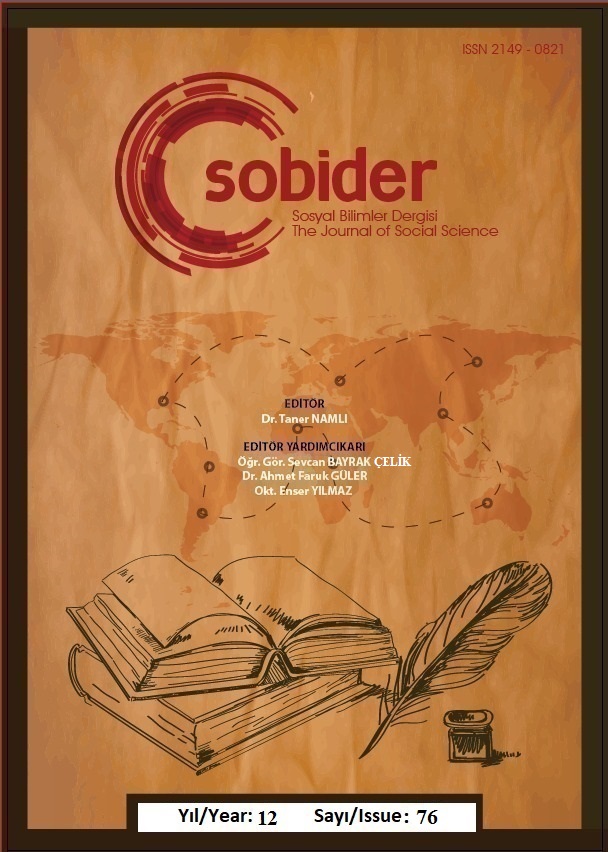GÖÇ SONRASI YERLEŞİKLEŞME VE GERİ DÖNÜŞ İRADESİ ARASINDAKİ GERİLİM: SURİYELİ SIĞINMACILARIN GERİ DÖNÜŞ NİYETLERİNİN ÇOK BOYUTLU ANALİZİ
Author :
Abstract
Bu çalışma, Türkiye’de geçici koruma statüsüyle yaşayan Suriyeli sığınmacıların geri dönüş niyetlerini etkileyen sosyo-psikolojik ve yapısal faktörleri çok boyutlu bir yaklaşımla analiz etmeyi amaçlamaktadır. Araştırma, açıklayıcı sıralı karma yöntem deseni çerçevesinde kurgulanmış; nicel ve nitel veri toplama teknikleri bütüncül biçimde kullanılmıştır. Nicel veriler, Gaziantep ilinde yaşayan 1000 Suriyeli sığınmacıdan elde edilen anket uygulamalarıyla toplanmış; açıklayıcı faktör analizi, lojistik regresyon, kümeleme analizi, yapısal eşitlik modellemesi ve karar ağacı sınıflandırma modeli gibi çok değişkenli istatistiksel analiz teknikleri kullanılmıştır. Nitel veriler ise 100 katılımcıyla gerçekleştirilen yarı yapılandırılmış bireysel görüşmelerden elde edilmiş ve içerik analizi yoluyla değerlendirilmiştir.
Araştırma bulguları, geri dönüş niyetinin yalnızca güvenlik veya ekonomik koşullarla açıklanamayacağını, aidiyet, toplumsal kabul, sosyal dışlanma ve psikolojik refah gibi çok boyutlu etkileşimlerin belirleyici olduğunu göstermektedir. Özellikle sosyal dışlanma düzeyinin geri dönüş niyeti üzerinde anlamlı etkisi olduğu saptanmış, aidiyet hissinin ise mediyatör değişken olarak etkide bulunduğu belirlenmiştir. Nitel bulgular, bu ilişkileri destekleyen bireysel deneyimleri görünür kılmış ve kararların zamansal, bağlamsal ve duygusal bir zeminde şekillendiğini ortaya koymuştur. Bu bağlamda çalışma, zorunlu göç sonrası yerleşiklik ve geri dönüş kararlarının ikili bir tercih üzerinden değil, “koşullu kalıcılık” ve “hibrit yerleşiklik” gibi dinamik yapılar üzerinden değerlendirilmesi gerektiğini ileri sürmektedir. Elde edilen bulgular, göç literatürüne teorik katkı sağlamanın yanı sıra, Türkiye’nin entegrasyon politikaları ve geri dönüş stratejileri açısından da işlevsel öneriler sunmaktadır.
Keywords
Abstract
This study aims to analyze the socio-psychological and structural factors influencing the return intentions of Syrian refugees residing in Turkey under temporary protection status through a multidimensional approach. The research is designed within the framework of an explanatory sequential mixed methods design, employing both quantitative and qualitative data collection techniques in an integrated manner. Quantitative data were gathered through surveys conducted with 1,000 Syrian refugees living in the province of Gaziantep. Multivariate statistical analysis techniques such as exploratory factor analysis, logistic regression, cluster analysis, structural equation modeling, and decision tree classification were utilized. Qualitative data were obtained through semi-structured individual interviews with 100 participants and were evaluated through content analysis.
The research findings indicate that return intentions cannot be explained solely by security or economic conditions; rather, they are shaped by multidimensional interactions such as belonging, social acceptance, social exclusion, and psychological well-being. Notably, the level of social exclusion was found to have a significant effect on return intentions, while the sense of belonging was identified as a mediating variable. The qualitative findings illuminated individual experiences that support these relationships and revealed that decisions are formed within a temporal, contextual, and emotional framework. In this context, the study argues that post-displacement settlement and return decisions should not be assessed through a binary preference model but rather through dynamic structures such as “conditional permanence” and “hybrid settlement.” The findings not only provide theoretical contributions to migration literature but also offer functional recommendations for Turkey’s integration policies and return strategies.





